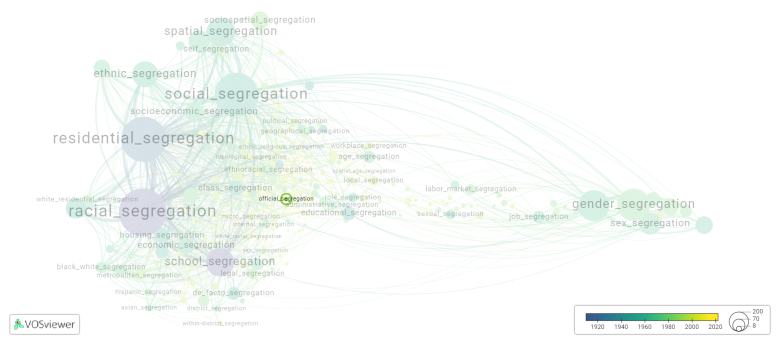Official segregation: Difference between revisions
(Creating page) |
(Creating page) |
||
| (4 intermediate revisions by the same user not shown) | |||
| Line 5: | Line 5: | ||
Official segregation refers to the systematic separation of individuals based on characteristics such as race, gender, nationality, or religion, as mandated by government authorities or institutional policies. Official segregation can take various forms, such as laws that mandate separate facilities or services for different groups, or policies that restrict individuals of certain groups from accessing certain opportunities. This form of segregation has been widely practiced throughout history, particularly in the United States with the implementation of Jim Crow laws that enforced racial segregation, and apartheid in South Africa which institutionalized racial segregation. The practice of official segregation has been widely condemned as a violation of human rights and is largely considered to be discriminatory and unjust. | Official segregation refers to the systematic separation of individuals based on characteristics such as race, gender, nationality, or religion, as mandated by government authorities or institutional policies. Official segregation can take various forms, such as laws that mandate separate facilities or services for different groups, or policies that restrict individuals of certain groups from accessing certain opportunities. This form of segregation has been widely practiced throughout history, particularly in the United States with the implementation of Jim Crow laws that enforced racial segregation, and apartheid in South Africa which institutionalized racial segregation. The practice of official segregation has been widely condemned as a violation of human rights and is largely considered to be discriminatory and unjust. | ||
==== | ==See also== | ||
==Related segregation forms== | |||
Official segregation is frequently discussed in the literature with the following segregation forms: | |||
[[racial segregation]] | |||
[[File:official_segregation.png|780x780px]] | |||
This visualization is based on the study [[Segregation_Wiki:About| The Multidisciplinary Landscape of Segregation Research]]. | |||
For the complete network of interrelated segregation forms, please refer to: | |||
* [https://tinyurl.com/2235lkhw First year of publication] | |||
* [https://tinyurl.com/2d8wg5n3 Louvain clusters] | |||
* [https://tinyurl.com/223udk5r Betweenness centrality] | |||
* [https://tinyurl.com/244d8unz Disciplines in which segregation forms first emerged (Scopus database).] | |||
==References== | ==References== | ||
==Notes== | ==Notes== | ||
<references /> | <references /> | ||
{{NoteAI}} | {{NoteAI}} | ||
==Official | ==Official segregation appears in the following literature== | ||
Marx A.W. (1999 | Marx A.W. (1999). Class discord and racial order: Economic interests and racial domination in south africa and the united states. ''Politikon'', ''26''(1), 81-101. https://doi.org/10.1080/02589349908705071 | ||
McHugh P. (2005 | McHugh P. (2005). Shared being, old promises, and the just necessity of affirmative action. ''Human Studies'', ''28''(2), 129-156. https://doi.org/10.1007/s10746-005-4189-z | ||
Wells J.E., Buckley G.L., Boone C.G. (2008 | Wells J.E., Buckley G.L., Boone C.G. (2008). Separate but equal? Desegregating Baltimore's gold courses. ''Geographical Review'', ''98''(2), 151-170. American Geographical Society.https://doi.org/10.1111/j.1931-0846.2008.tb00294.x | ||
Wiegman R. ( | Wiegman R. (201). Whiteness studies and the paradox of particularity. ''Interdisciplinarity and Social Justice: Revisioning Academic Accountability'', 217-243. State University of New York Press.https://doi.org/ | ||
Posner R.A. (2016 | Posner R.A. (2016). Book Review of Rattling the Cage: Toward Legal Rights for Animals by Steven M. Wise. ''The Animal Ethics Reader: Third Edition'', 672-675. Taylor and Francis.https://doi.org/10.4324/9781315688718-68 | ||
Latest revision as of 07:17, 16 October 2024
Date and country of first publication[1][edit | edit source]
1999
United States
Definition[edit | edit source]
Official segregation refers to the systematic separation of individuals based on characteristics such as race, gender, nationality, or religion, as mandated by government authorities or institutional policies. Official segregation can take various forms, such as laws that mandate separate facilities or services for different groups, or policies that restrict individuals of certain groups from accessing certain opportunities. This form of segregation has been widely practiced throughout history, particularly in the United States with the implementation of Jim Crow laws that enforced racial segregation, and apartheid in South Africa which institutionalized racial segregation. The practice of official segregation has been widely condemned as a violation of human rights and is largely considered to be discriminatory and unjust.
See also[edit | edit source]
Related segregation forms[edit | edit source]
Official segregation is frequently discussed in the literature with the following segregation forms:
This visualization is based on the study The Multidisciplinary Landscape of Segregation Research.
For the complete network of interrelated segregation forms, please refer to:
References[edit | edit source]
Notes[edit | edit source]
- ↑ Date and country of first publication as informed by the Scopus database (December 2023).
At its current state, this definition has been generated by a Large Language Model (LLM) so far without review by an independent researcher or a member of the curating team of segregation experts that keep the Segregation Wiki online. While we strive for accuracy, we cannot guarantee its reliability, completeness and timeliness. Please use this content with caution and verify information as needed. Also, feel free to improve on the definition as you see fit, including the use of references and other informational resources. We value your input in enhancing the quality and accuracy of the definitions of segregation forms collectively offered in the Segregation Wiki ©.
Official segregation appears in the following literature[edit | edit source]
Marx A.W. (1999). Class discord and racial order: Economic interests and racial domination in south africa and the united states. Politikon, 26(1), 81-101. https://doi.org/10.1080/02589349908705071
McHugh P. (2005). Shared being, old promises, and the just necessity of affirmative action. Human Studies, 28(2), 129-156. https://doi.org/10.1007/s10746-005-4189-z
Wells J.E., Buckley G.L., Boone C.G. (2008). Separate but equal? Desegregating Baltimore's gold courses. Geographical Review, 98(2), 151-170. American Geographical Society.https://doi.org/10.1111/j.1931-0846.2008.tb00294.x
Wiegman R. (201). Whiteness studies and the paradox of particularity. Interdisciplinarity and Social Justice: Revisioning Academic Accountability, 217-243. State University of New York Press.https://doi.org/
Posner R.A. (2016). Book Review of Rattling the Cage: Toward Legal Rights for Animals by Steven M. Wise. The Animal Ethics Reader: Third Edition, 672-675. Taylor and Francis.https://doi.org/10.4324/9781315688718-68

